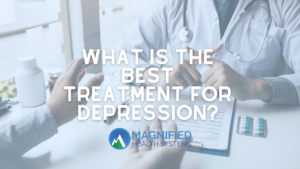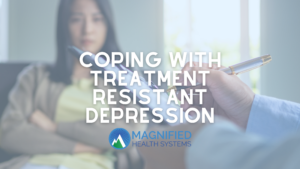Have you ever pondered the root reasons for clinical depression? Perhaps a significant depression diagnosis has led you to wonder why some people experience depression while others do not. Depression is a complicated scenario. Although there are many potential causes, no one is certain of their actual cause. During a severe medical condition, some people experience depression. Others may experience depression when their lives change, such as when they move or lose a loved one. Still, others have a history of depression in their families. Those who do could suffer from depression and experience overwhelming melancholy and loneliness for no apparent reason.
Major depressive disorder, sometimes known as depression, is a serious medical condition that frequently affects people’s feelings, thoughts, and behaviors. Thankfully, it is also curable. Sadness and/or a loss of interest in previous hobbies are symptoms of depression. It can impair your ability to perform at work and at home and cause a number of mental and physical issues. A diagnosis of depression requires symptoms to have persisted for at least two weeks and to have altered your prior level of functioning. It’s crucial to rule out general medical causes because certain medical diseases, such as thyroid issues, brain tumors, and vitamin deficiencies, can resemble the symptoms of depression.
Depression can have many different causes. It has numerous triggers and a wide range of potential causes. A traumatic or stressful life event, such as a death in the family, a divorce, a sickness, a layoff, or concerns about one’s career or finances, maybe the culprit for some people.
Depression frequently results from a combination of many reasons. As an illustration, you might be depressed after being ill and then go through a painful incident, like losing a loved one.
It is more likely that you will experience depression if someone in your family—such as a father, sister, or brother—has experienced it in the past. A recent major life event, a favorable family history of depression, and a personal history of prior depressive episodes are three of the most frequently mentioned and potent predictors of depression. However, little research has examined how these indicators interact in depressed groups. Such details are useful from a descriptive perspective and may shed light on the etiology.
50 words, can include a bulleted list of examples of trauma
There is broad agreement that childhood trauma plays a key role in the emergence of depression. Clinical ramifications demand a thorough evaluation of childhood trauma in chronically depressed patients, with an emphasis on:
Multiple childhood traumas in particular may have a connection to long-term depression.
Long-term brain alterations, particularly in the hippocampus, are probably brought on by persistent depression. Perhaps this explains why depression in certain people is so challenging to treat. The amygdala, hippocampus, and dorsomedial thalamus are the primary subcortical limbic brain areas associated with depression. Depression has been associated with both structural and functional abnormalities in these regions.
Some people turn to excessive alcohol or drug use as a coping mechanism when life becomes difficult. Depression may worsen as a result of this. Although marijuana can help you unwind, there is evidence that it can also worsen depression, especially in teenagers. Substance abuse perpetuates the negative mood scenario, and in some instances amplifies it, which poses a high risk.
It’s crucial to rule out general medical causes because certain medical diseases, such as thyroid issues, brain tumors, and vitamin deficiencies, can resemble the symptoms of depression. If you suffer from chronic or life-threatening diseases like cancer or coronary heart disease, you may be more likely to experience depression.
Another frequently ignored cause of depression is head injury. Emotional issues and mood swings may be brought on by a major brain injury.
Most people need some time to adjust to traumatic situations like losing a loved one or ending a relationship. If you quit visiting your friends and family and try to solve your problems on your own when these stressful events happen, your risk of developing depression will increase.
If you possess certain personality qualities, such as being an overachiever and demanding perfection, not progressing from oneself, or being excessively self-critical, you may be more susceptible to melancholy. Your genes from your parents, your early experiences, or both may be to blame for this.
The sexual orientation spectrum has been the cause of depression, and in severe cases, suicide, for people who identify a certain way and face rejection from their immediate society. This can lead to feelings of worthlessness and self-disgust, which leads to depression, which if it goes untreated can be fatal.
Thirty percent of patients with severe depression are refractory to treatment and require specific treatment-resistant depression management techniques because seventy percent of patients with major depression respond to initial antidepressant therapy. Depression should not be ignored, and not go untreated. Every therapeutic paradigm must be used while assisting individuals with treatment-resistant depression because there are numerous possibilities for the treatment of major depression and treatment-resistant depression.
Despite the seemingly insurmountable mountain of depression, not all hope is lost. At Magnified, we walk with the patient all throughout their treatment. We strive to develop a deeper comprehension of the patient to be able to manage his/her treatment process. At Magnified Health Systems, its objective is to support your mental health. If you haven’t had luck with your other depression treatments, let’s talk. To learn more about treatment and inpatient rehab, give us a call today and schedule an appointment.
Get confidential help 24/7. Call now for:
Related Articles
Get Help Now
Medical Advice Disclaimer
Magnified Health Systems aims to improve the quality of life for people struggling with substance use or mental health disorder with fact-based content about the nature of behavioral health conditions, treatment options and their related outcomes. We publish material that is researched, cited, edited and reviewed by licensed medical professionals. The information we provide is not intended to be a substitute for professional medical advice, diagnosis or treatment. It should not be used in place of the advice of your physician or other qualified healthcare providers.

Dr. Bickley graduated from U.C. Irvine with honors: Phi Beta Kappa, Golden Key International Honor Society, Cum Laude. He has been featured on national radio and print media. He is also a frequent lecturer at National Conferences. He holds an A.S. degree in Drug & Alcohol Studies, and two B.A. degrees in Criminology & Psychology, and masters and doctoral degree in Clinical Psychology. He is a licensed California Drug & Alcohol Counselor Level II, a licensed Clinical Supervisor and is certified in treating Eating Disorders.

The best treatment for depression is one that considers each person’s specific needs. Although that may sound obvious, people with depression struggle in different ways and can benefit from multiple forms of therapy.

Even with effective treatment, major depression does not always go away, and persistent or challenging-to-treat depression has been shown to add to the significant disease burden brought on by depression.
Call Us Now, Our Admissions Team Is Standing By And Available 24/7.

Head Office Location:
1530 N Federal Hwy Lake Worth, FL 33460
Contact & Feedback:

We are here for you.
We are here for you, Call us and get started!
